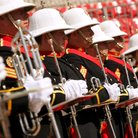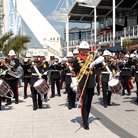Band Of HM Royal Marines: England Expects
We all love the grand and disciplined musical displays by the Band Of HM Royal Marines. But just how much work goes into their performances?
The concerts by the Band Of HM Royal Marines are breathtaking occasions, from the rows of 180 immaculately presented musicians in full military uniform to the mesmerising appearances from the Fanfare Trumpets and Corps of Drums. It’s an impressive scene that seems far removed from the dirt and confusion of conflict. Going to war is not an unfamiliar prospect for the musicians, however, as Band Colour Sergeant Ian Davies RM explains.
"Our role is to provide support to the Royal Marines and the Royal Navy in whatever way is deemed appropriate. In conflict situations, band members often work in a medical capacity, for which we receive training, or we may be asked to perform music simply to boost morale." Indeed, after hearing an on-board performance from the Royal Marines band during the Falklands War, an officer told the band’s conductor that if he could have "given his men rifles and put them ashore at that moment, they would have walked right across [the Falklands] and nothing would have stopped them."
Music’s ability to provoke a powerful emotional response has long since been documented. But it’s not all about pomp and power: members of the Royal Marines bands receive three years of first-rate musical training, comparable to the tuition from a regular music college. Not only does this equip every player with the essential knowledge and skills for a successful career, but it also means that musical life within the Royal Marines is popular, thriving – and competitive.
"Prospective candidates come down to Portsmouth for one audition that lasts for five days – we really examine all aspects of their playing," explains Davies. "The training is intensive and we want to be sure everyone is capable of undertaking their duties." In addition to studying the theoretical and historical side of music, most students learn at least two instruments, which are provided by the Royal Marines – and often one of these is learnt from scratch when they enrol.
"We’re fortunate to have some superb instrumental teachers," explains Davies. "For example, we can get students up to Grade 8 standard on the violin in two years and eight months."
To match this instrumental variety, there are also numerous ensembles for the students to play in.
"Although we’re best known for our ceremonial marching bands, we also have symphony orchestras, big bands, string quartets, jazz bands and wind-bands – you name it, we do it," says Davies.
Nevertheless, it’s still astonishing to discover that the five bands within the Royal Marines Band Service collectively play in over 1600 engagements a year, which range from royal weddings to concerts in schools, to performing in large concert halls anywhere in the world.
"Travel is certainly a big perk of the job," says Davies, "It’s a fantastic way to see the world and fly the flag for Britain and the Royal Navy, but then playing in the Royal Marines is a very privileged occupation."




